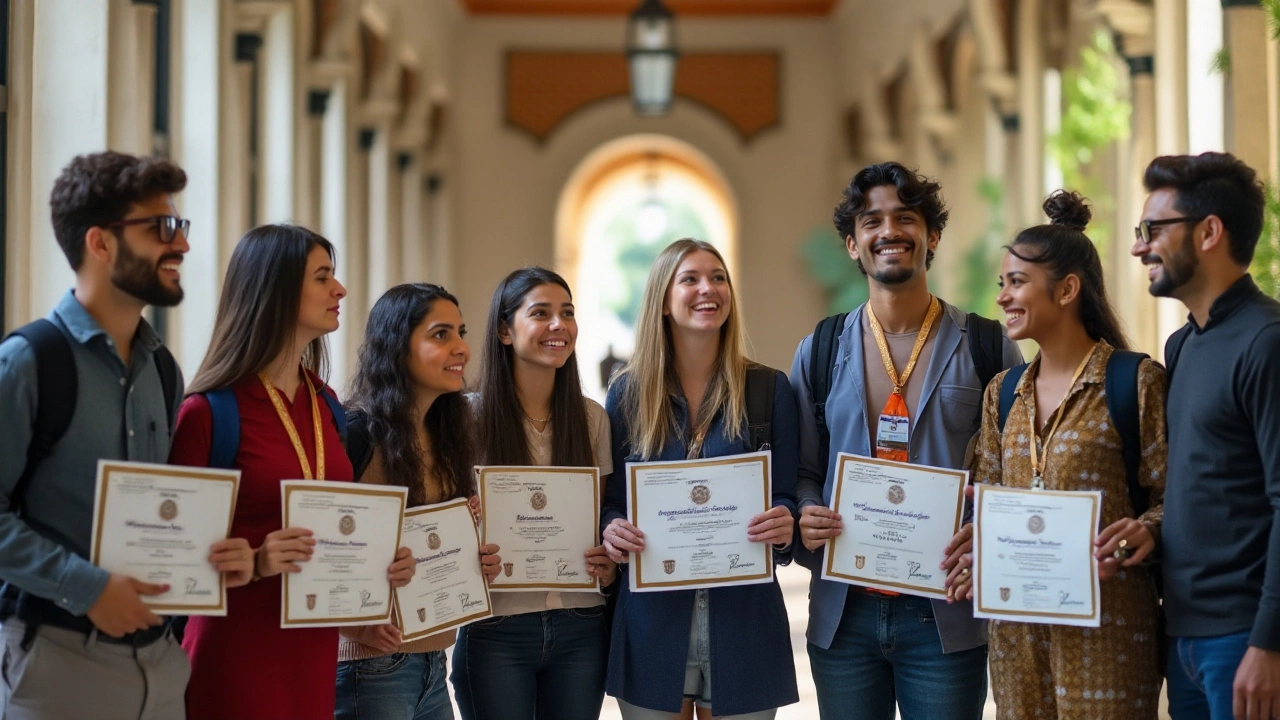The globalization of education has brought unique opportunities and challenges for students around the world. Among various educational boards, the Central Board of Secondary Education, or CBSE, holds a prominent place in India. As students look westward towards the USA for higher education, a pertinent question arises: Is CBSE accepted there?
This exploration seeks to clarify how American colleges and universities view CBSE qualifications. It's essential for students and parents alike to understand the recognition and challenges faced by CBSE alumni in the United States. Education systems differ, and knowing how they align or clash can significantly impact academic and professional trajectories. We'll unpack these intricacies and offer guidance for those navigating this educational journey.
- Introduction to CBSE and Its Global Reach
- Recognition of CBSE in American Educational Institutions
- Challenges Faced by CBSE Students in the USA
- Aligning CBSE Curriculum with US Standards
- Tips for Indian Students Planning to Study in the USA
- Conclusion: Future Outlook for CBSE Students in America
Introduction to CBSE and Its Global Reach
The Central Board of Secondary Education, commonly known as CBSE, stands as one of India's most prominent educational boards. Established in 1929, it was initially meant to serve the educational needs of expatriate children in India. However, it has since grown exponentially and now oversees more than 20,000 schools across the nation, including a handful of international locations. CBSE is renowned for its comprehensive syllabus and balanced approach to theory and practical knowledge, making it an attractive choice for many Indian families. As education has increasingly transcended borders, CBSE's influence and popularity have extended beyond India, capturing the attention of educational institutions worldwide. It is a globally recognized curriculum that emphasizes science and mathematics, preparing students for numerous international education systems, including those found in the USA.
The structure of the CBSE curriculum places a significant emphasis on the holistic development of a student's analytical and problem-solving skills. This is achieved not only through rigorous academic standards but also through extracurricular activities and sports, which are an integral part of the board's approach. Such a diverse educational structure helps cultivate well-rounded individuals who are prepared for the challenges of higher education in diverse environments. The global reach of CBSE can partly be attributed to its alignment with several international curricula, which allows many students to seamlessly transition to foreign education systems after completing their primary education in India. Interestingly, many CBSE-affiliated schools are established outside of India to cater to the large Indian diaspora, which showcases the board's adaptability to different educational landscapes.
A remarkable aspect of CBSE's global expansion is the board's dedicated focus on continuously updating its syllabus to match the dynamic changes in global education standards. Unlike other educational boards that may follow more fixed syllabi, CBSE prides itself on being progressive and incorporating cutting-edge educational practices and technologies. By benchmarking its curriculum against the best practices globally, CBSE ensures that its students are always a step ahead. According to a report by the New York Times, "International boards like CBSE are pivotal in bridging the educational gap between Eastern and Western educational systems, promoting a culture of learning that is unparalleled."
The curriculum's flexibility is evident in its language options and elective subjects, which allow students to tailor their education to their interests and future career aspirations. It is this versatility that endears CBSE to parents wishing to provide an education that is both locally grounded and internationally competitive. The board's commitment to fostering critical thinking and adaptability is a testament to its potential as an educational powerhouse with far-reaching impacts. As India continues to expand its influence globally, CBSE is poised to play a crucial role in shaping the educational experiences of millions of students around the world, ensuring that they have access to quality education that meets international standards.
Recognition of CBSE in American Educational Institutions
The CBSE qualification has gained significant attention from academic institutions worldwide, including those in the United States. Known for its rigorous curriculum, CBSE provides students with a robust foundation that is often compared to international standards such as the Advanced Placement (AP) courses offered in American high schools. The recognition of CBSE by American universities, while generally positive, varies depending on the institution's internal policies and their familiarity with international education boards. This variation can lead to both opportunities and challenges for students seeking to study in the United States.
One of the major aspects of recognition is how colleges equate CBSE grades with the American Grade Point Average (GPA). Admission offices typically evaluate these scores to ensure that prospective students meet the competitive entry requirements. Since CBSE emphasizes a diverse range of subjects and a high level of academic performance, many U.S. universities acknowledge the rigor of the CBSE exams and subsequently accept it for undergraduate admissions. However, it is advisable for students to research individual colleges to understand specific entry requirements, as discrepancies might occur regarding the correspondence of grading systems.
Admissions Criteria and Global Acceptance
In recent years, there has been a notable increase in the number of Indian students studying in the USA, thereby prompting educational institutions to develop a better understanding of the CBSE curriculum. This familiarity helps in setting a more standardized approach to admissions. Admissions officers often look at the overall profile of the student, including extracurricular achievements, which works in favor of Indian students accustomed to a holistic view of education similar to that valued in the U.S.In certain cases, students might need to supplement their CBSE results with standardized tests such as the SAT or ACT, which are widely recognized by nearly all American colleges. Some institutions also accept the SAT Subject Tests as evidence of subject-specific proficiency, which can bolster a student’s application considerably. To put it in perspective, a report by the Institute of International Education highlighted that nearly 84% of U.S. universities are actively seeking diversity, thus valuing international curriculums such as CBSE.
"The growing diversity within American academic institutions highlights the importance of comprehending different educational systems. CBSE graduates, given their distinct academic pedigree, can substantively contribute to this enriching mix," remarks Dr. Allen Robertson, Dean of Admissions at a reputed U.S. university.
For aspiring students, obtaining a clear understanding of how a particular U.S. institution recognizes the CBSE credential is crucial. This includes precise information on minimum required grades and any additional tests that might enhance their application. Visit official university websites or speak directly with admissions counselors to ensure accurate, up-to-date guidance. Memorizing these intricacies and planning accordingly can considerably smooth the transition from the Indian system to the American educational setup.
A broader recognition of CBSE in the USA is a reflection of globalization in education, beckoning more Indian students to explore quality educational opportunities across the globe. By maintaining an open dialogue between educational institutions and establishing equivalences between different academic boards, greater acceptance and ease of transition can be achieved, enhancing international student experiences.

Challenges Faced by CBSE Students in the USA
Students coming from a CBSE background can find the transition to the U.S. educational system both exciting and daunting. One major challenge lies in aligning their academic qualifications with American standards. While many universities recognize CBSE, understanding its equivalency can be complex, particularly when it comes to the grading system. The CBSE percentage or scores might not directly translate to the GPA scale used by most U.S. institutions. Admissions officers may need additional information to accurately assess the student's achievements. This often requires students to take standardized tests like the SAT or ACT, adding an extra layer of preparation and stress in their already busy schedules.
Another significant hurdle is the cultural shift. The teaching style and curriculum in the USA focus heavily on critical thinking and individual expression. This contrasts with the rote learning methods often used within CBSE. Consequently, Indian students may struggle initially with the open-ended assessments and class discussions prevalent in U.S. schools. The emphasis on extracurricular activities and a holistic resume can also be overwhelming for those accustomed to a more academically-focused education system. Hence, it becomes crucial for students to adapt quickly and engage beyond academics.
Financial considerations also pose challenges. Many CBSE students may require financial aid or scholarships to study abroad, which adds another competitive layer to the application process. The cost of living in various parts of the USA can be substantially higher than in India, necessitating careful budgeting and planning. Additionally, the visa process can be intricate and stressful, with students needing to navigate a myriad of forms, deadlines, and interviews, all of which can be unfamiliar and anxiety-inducing.
Language barriers, though less common among CBSE students who are typically proficient in English, can still present challenges, particularly around accents and educational jargon. This can make the initial academic experience somewhat intimidating until they become accustomed to these differences. The need to integrate socially also requires students to step out of their comfort zones and make connections in a new cultural context.
"For many Indian students, the bridge they have to cross to study in the U.S. is massive, but it is worth the journey," said a noted education counselor in a recent seminar on international student experiences.
Yet, these challenges, while significant, are not insurmountable. Many students find that the key to overcoming these obstacles is early preparation and seeking resources for support. Connecting with Indian communities or student organizations on campus can offer a familiar touchstone and help create a support network that eases cultural transitions. Educational counselors often recommend utilizing university services such as tutoring centers, writing workshops, and mentoring programs to build skills necessary for success in the American academic milieu.
CBSE students are uniquely positioned to offer a diverse perspective in American classrooms, having experienced a rigorous education that can add value to class discussions and group projects. By leveraging this background while embracing new methodologies and cultural experiences, students can transform potential challenges into opportunities for personal growth and global awareness.
Aligning CBSE Curriculum with US Standards
The prospect of pursuing higher education in the USA presents a unique set of challenges for students who have completed their schooling under the CBSE board. The educational methodologies employed by CBSE emphasize a comprehensive understanding of core subjects, with a curriculum often lauded for its rigor and depth. However, aligning this curriculum with the education standards prevalent in the US demands careful navigation. The American education system often champions a broad-based learning approach, encouraging electives and extracurricular engagement, something that might not always be emphasized in the CBSE framework.
Bridging this gap requires a multifaceted approach. Students often need to engage in supplementary learning to familiarize themselves with subjects like American History or English Literature in-depth. The acceptance of CBSE qualifications is not uniform across all institutions. Some universities might mandate Standardized Tests, such as the SAT or ACT, as a means to ensure academic readiness. Interestingly, some schools have developed bridge courses specifically designed to help incoming international students acclimate to the American educational system.
The Role of Advanced Placement and Other Programs
Another consideration comes in the form of Advanced Placement (AP) courses. These have become a popular choice among CBSE students aiming to align their education with US standards effectively. AP courses offer a chance to earn college credit during high school, mirroring the depth and challenge of college-level work, providing CBSE students with an opportunity to demonstrate proficiency in areas valued by US institutions. It’s noteworthy how many Indian students are excelling in AP tests, taking subjects in physics, calculus, and chemistry that are generally on par with their CBSE curriculum. It's a testament to the rigorous training provided by CBSE, yet also a reflection of the students' willingness to adapt and expand their educational horizon.
The diversity in educational assessment between the two can also be observed in assignments and projects. CBSE has traditionally focused on year-end comprehensive exams, while American schools stress continuous assessment through essays, presentations, and projects. This methodology not only enhances a student's learning experience but also helps in shaping analytical and creative thinking, attributes very much in demand by American universities. According to a study published by Global Education Research, students coming from curricula that favor diverse teaching methods adapt more swiftly and successfully to tertiary education in international contexts.
A renowned education analyst once remarked, "Education is the passport to the future, for tomorrow belongs to those who prepare for it today."Understanding this landscape helps students and parents make informed decisions. Engaging in additional workshops and bridging programs, leveraging online courses, and seeking academic counseling all play a part in ensuring CBSE graduates meet the expectations of American colleges.

Tips for Indian Students Planning to Study in the USA
Studying in the USA can be a life-changing decision for many Indian students, seeking not just an education but an avenue for personal and professional growth. However, the transition from the Indian education system to the American one can be both exciting and daunting. To help navigate this journey, it is crucial to understand the nuances of preparation that can ensure a smooth transition. CBSE students should start by researching universities that recognize their high school curriculum. It’s common for American colleges to have specific prerequisites, so aligning your subjects and grades early on can save time and stress later.
One of the significant aspects of preparing is understanding the testing requirements. Most American institutions require standardized tests like SAT or ACT. Embarking on early preparation and taking practice tests can play a pivotal role in achieving excellent scores. Additionally, investing time in building a strong portfolio with extracurricular activities, volunteer work, and other interests will enhance your application. According to a report, students who showcase diverse skills and achievements are perceived as more adaptable and capable of handling university challenges.
The application process is another critical phase where attention to detail is essential. Applying to universities in the USA involves more than filling out forms; it requires a strategic approach. Writing compelling personal statements and collecting letters of recommendation that highlight specific strengths and achievements can give an applicant an edge. Consulting with education counselors who are well-versed with the American system can provide personalized guidance. They offer insights into crafting applications that resonate well with admissions officers.
The logistical aspects of moving abroad also demand attention. Securing a student visa is a predominant step, and students should familiarize themselves with the visa process and requirements. Arranging finances is another crucial element, as studying in the USA can be expensive. Exploring scholarships, grants, and student loans can ease the financial burden. An insightful piece of advice shared by John Smith, a former admissions officer at a reputed university, states,
The key to a successful application is authenticity. Your true self is your greatest asset, let it shine through without exaggeration.
Upon acceptance, preparing for cultural adaptation can make settling in much easier. Embracing the cultural diversity and openness of the American education system fosters a supportive environment for learning. Engaging with student support services on campus—such as counseling, mentoring, and academic advising—can enhance the overall college experience.
Conclusion: Future Outlook for CBSE Students in America
The journey of a CBSE student aspiring to study in the USA is not merely a passage between geographical spaces but a bridge between educational cultures. This transition is gaining momentum as the world becomes a global village, breeding diverse opportunities for students. The United States, as a beacon of higher education, offers a promising future for those who are equipped with the adaptive skills necessary to thrive. It is evident that the acceptance of CBSE systems by American institutions is a reflection of this global integration. Yet, this acceptance harbors complexities that demand strategic navigation.
American universities and colleges have progressively shown open-mindedness in recognizing the CBSE syllabus, attracting a significant number of Indian students each year. However, the alignment of curriculums remains a challenge, urging students to bridge educational gaps actively. Engaging in extracurricular activities, gaining proficiency in English, and understanding the pedagogical nuances of the American education system are pivotal. A strong academic record bolstered by competitive test scores like the SAT or ACT can also assert a student’s readiness to dive into this scholastic arena.
The horizon seems bright for CBSE students eyeing the USA, with countless alumni setting precedents for academic excellence and professional success. Innovative careers and multicultural exposure await those who can adapt to, and harness, the educational ethos of the West. As one esteemed educator once aptly put it,
"Education is not the filling of a pail, but the lighting of a fire."This illuminates the transformative potential imbedded in a CBSE student’s journey abroad.
Despite hurdles such as visa regulations and financial considerations, strategic planning coupled with informed decision-making can forge a path to a remarkable future. Moreover, scholarship opportunities specifically designed for international students, including those from a CBSE background, can ease the financial burden. With time, as international educational frameworks continue to evolve, the potential for even deeper recognition of the CBSE curriculum holds promise.
Thus, with determination and a willingness to adapt, CBSE students can truly carve out a niche for themselves in America's educational landscape. Patience and perseverance are key, as the tomorrows shaped by today’s investment in their education stand to offer not just personal and professional growth, but also the enrichment of a diverse and dynamic cultural melting pot.

Write a comment